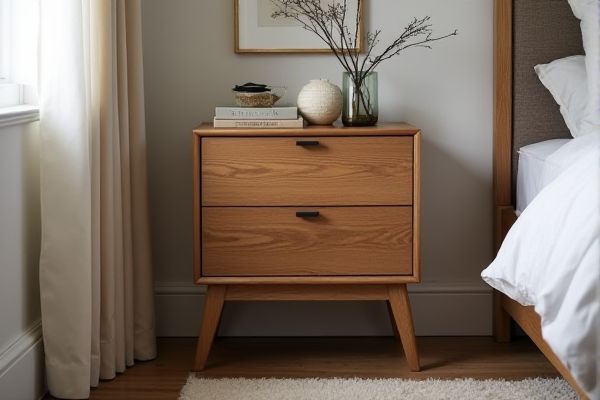
Splayed leg nightstands offer a mid-century modern aesthetic with angled legs that provide stability and a unique design element, while tapered leg nightstands feature slender, gently narrowing legs that create a sleek and minimalist look. Discover which style best complements Your bedroom decor and meets Your functional needs by reading the rest of the article.
Table of Comparison
| Feature | Splayed Leg Nightstand | Tapered Leg Nightstand |
|---|---|---|
| Leg Design | Angled outward for stability and mid-century style | Legs narrow downwards, creating an elegant, slim profile |
| Style | Mid-century modern, retro, vintage vibe | Contemporary, minimalist, Scandinavian influence |
| Stability | High stability due to wider base | Moderate stability with a sleek look |
| Visual Impact | Bold, eye-catching, statement piece | Subtle, refined, blends effortlessly |
| Common Materials | Wood (teak, walnut), metal accents | Wood (oak, maple), metal or plastic legs |
| Ideal Room Setting | Retro or eclectic bedrooms | Modern, minimalist, or Scandinavian bedrooms |
| Maintenance | Easy to clean, durable finishes | Requires gentle care for slender legs |
Splayed Leg Nightstand: Design Overview
Splayed leg nightstands feature legs that angle outward, providing a mid-century modern aesthetic and enhanced stability. This design creates a visually lighter piece of furniture that complements minimalist and Scandinavian interiors. Their unique leg structure also allows for easier cleaning underneath compared to straight-legged alternatives.
Tapered Leg Nightstand: Design Overview
Tapered leg nightstands feature legs that gradually narrow towards the bottom, creating a sleek and elegant profile that enhances modern and mid-century furniture styles. Their design often emphasizes clean lines and minimalism, making them an ideal choice for bedrooms that prioritize a contemporary aesthetic. You'll find that tapered legs provide a subtle lift to the nightstand, contributing to a sense of spaciousness and lightness in your room.
Visual Style Comparison
Splayed leg nightstands offer a mid-century modern aesthetic with angled legs that create an open, airy feel, emphasizing retro charm and casual elegance. Tapered leg nightstands present a sleek, minimalist design featuring straight legs that narrow towards the bottom, lending a refined and contemporary look suitable for modern interiors. Your choice between these styles will impact the room's visual flow, with splayed legs adding dynamic movement and tapered legs offering streamlined sophistication.
Stability and Durability Differences
Splayed leg nightstands offer enhanced stability due to their wider base, effectively distributing weight and reducing wobbling on uneven surfaces. Tapered leg nightstands, while visually sleek, may compromise durability as their narrower legs bear load unevenly, increasing the risk of stress fractures over time. Material quality and construction techniques further influence the long-term stability and durability of both styles.
Space and Room Compatibility
Splayed leg nightstands offer a wider base, providing greater stability and a retro aesthetic that complements mid-century modern or eclectic spaces, making them ideal for larger rooms with open layouts. Tapered leg nightstands feature slimmer, angled legs that create a more streamlined profile, optimizing floor space and blending seamlessly into compact or minimalist rooms. Choosing between these styles depends on available space and design intent, with splayed legs enhancing visual interest and tapered legs maximizing room compatibility.
Material and Construction Variations
Splayed leg nightstands often feature solid wood construction with reinforced joinery to support their angled leg design, enhancing stability and durability. Tapered leg nightstands typically incorporate a blend of solid wood and engineered wood or MDF, utilizing sleek, slender legs that emphasize modern aesthetics while maintaining structural integrity. Both styles may use veneers or laminates to achieve various finishes, but splayed legs emphasize robust craftsmanship, whereas tapered legs focus on minimalist elegance through refined material application.
Cleaning and Maintenance Considerations
Splayed leg nightstands tend to have wider leg bases, making it easier to clean around and beneath them without trapping dust in narrow spaces. Tapered leg nightstands feature narrower, angled legs that can accumulate dust and debris more easily, requiring more frequent and detailed cleaning. Choosing between the two depends on your preference for maintenance effort and how thorough you want your cleaning routine to be.
Popular Decor Styles for Each Leg Type
Splayed leg nightstands are a hallmark of mid-century modern decor, characterized by clean lines and a retro vibe that complements minimalist and Scandinavian interiors. Tapered leg nightstands, often seen in traditional and transitional styles, offer a more refined and elegant silhouette that suits classic, contemporary, and even farmhouse aesthetics. Your choice between these leg types can define the overall style of your bedroom, blending functionality with the visual appeal of your preferred decor.
Pros and Cons: Splayed vs Tapered Legs
Splayed leg nightstands offer enhanced stability and a mid-century modern aesthetic, making them ideal for uneven floors but can be bulkier and harder to fit in tight spaces. Tapered leg nightstands provide a sleek, minimalist look that visually lightens the room and saves space, though they may lack some sturdiness on uneven surfaces. Choosing between splayed and tapered legs depends on balancing stability needs with design preferences and room size constraints.
How to Choose the Right Nightstand for Your Space
When choosing between a splayed leg nightstand and a tapered leg nightstand, consider the room's style and available space; splayed legs often provide a mid-century modern look with a wider stance for stability, ideal for larger rooms, while tapered legs offer a sleek, minimalist appeal that can make smaller spaces feel less cluttered. Measure the height and width of your bed and surrounding area to ensure the nightstand fits comfortably without crowding the space. Select materials and finishes that complement existing furniture and enhance the room's overall aesthetic for a cohesive design.
 homyna.com
homyna.com